Conveyors are the backbone of material handling in the food industry. These mechanical workhorses play a pivotal role in transporting raw ingredients through various stages of production until they reach the packaged products lining our shelves. As a UK specialist of conveyor systems, we’re here to shed some more light on them and how they can play an important part in your food business if you decide to make an investment.
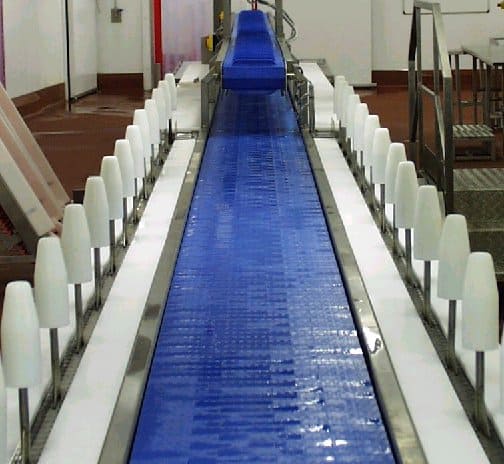
The Foundation of Conveyors in Food Processing
The evolution of conveyors in the food industry can be traced back to the early 20th century when the assembly line concept gained traction. Factories sought ways to optimise production processes, and conveyors emerged as a groundbreaking solution. The conveyor belt, a simple yet ingenious invention, revolutionised material handling, enabling a continuous flow of goods and reducing the reliance on manual labour.
Fast forward to the present day, and conveyors have become indispensable in the food industry. The diversity of conveyor types allows for tailored solutions, each serving a unique purpose. But what types are there to choose from?
Types of Conveyors Used in the Food Industry
Belt Conveyors
Belt conveyors consist of a continuous belt and are available in various configurations to handle a diverse range of food products. Unitech specialises in three distinct types: modular belt conveyors, PU (Polyurethane) belt conveyors, and wire belt conveyors.
Modular belt conveyors feature interlocking plastic modules that link together, forming a continuous belt. The modular structure makes cleaning and maintenance easy as each section can be quickly replaced, helping to minimise downtime.
PU belt conveyors use belts made of polyurethane, a durable material known for its resistance to abrasion and ease of cleaning. PU belts are preferred for their smooth and non-porous surfaces, making them ideal for transporting sensitive food products while ensuring high hygiene standards.
Wire belt conveyors utilise a mesh of interlinked metal wires to form a continuous belt. These conveyors are well-suited for handling items with high temperatures or those requiring air circulation. Ideal for bakery and confectionary products.
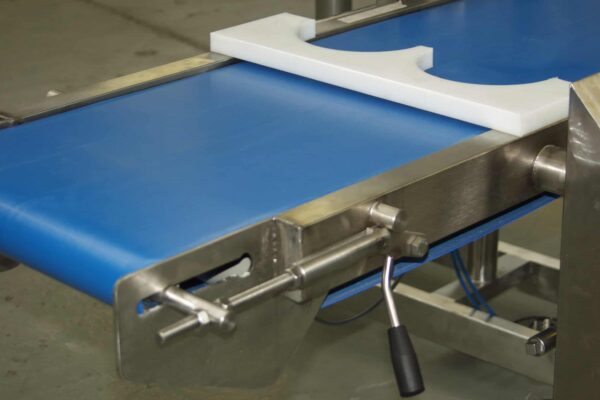
Roller Conveyors
Employing a series of rollers to move materials, roller conveyors are particularly efficient for handling heavier loads. They play a crucial role in the packaging stages of food production, providing an efficient means of transporting boxes, cartons, and loaded pallets.
Depending on your requirements, these conveyors can be either powered or non-powered. Powered roller conveyors are equipped with motors, enabling automated movement for improved throughput. In contrast, non-powered roller conveyors rely on gravity or manual force, offering a cost effective solution suitable for less demanding applications.
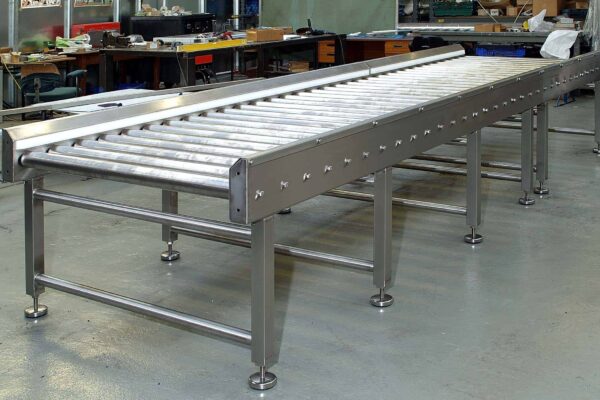
Spiral Conveyors
Spiral conveyors represent a unique and innovative solution in the world of material handling, particularly in the food industry where space optimization is crucial. These conveyors are designed in a helical shape, allowing them to move products vertically or in a spiral pattern between different levels of a facility.
The primary advantage of spiral conveyors lies in their ability to conserve floor space, making them invaluable for facilities with limited square footage.
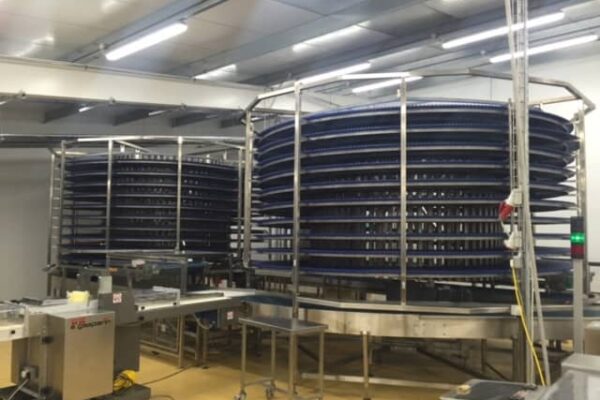
Chain Indexing Conveyors
Chain indexing conveyors operate using a chain mechanism that moves materials in a controlled, indexed manner. These conveyors are particularly effective for assembly lines and ‘start – stop’ applications, where products are moved in a series of steps rather than a continuous flow.
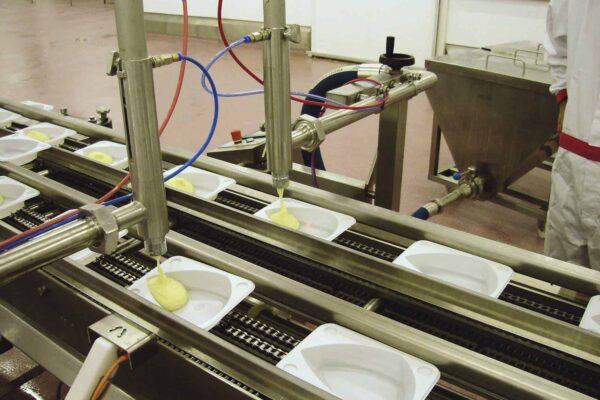
Vibratory Conveyors
As the name suggests, vibratory conveyors use vibrations to move materials along a trough. These conveyors are particularly effective for delicate products such as fruit, vegetables, snack foods, cereals and grains. The vibratory motion is designed to help prevent damage during transport.
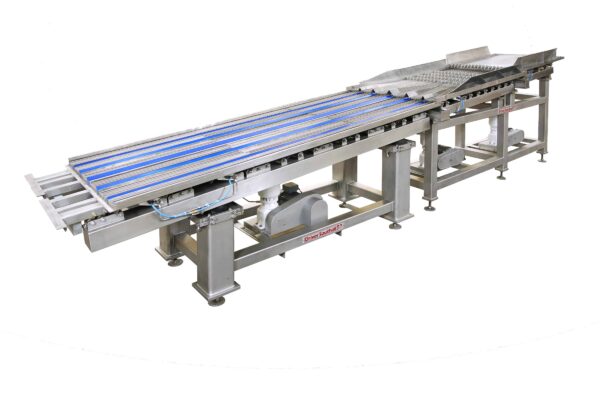
How Food Conveyors Can Help Your Business
So you’ve chosen the type of conveyor(s) that’s suitable for your business. What should you expect in return?
Quite a lot actually! For example, one of the biggest advantages of a conveyor system lies in its ability to replace manual labour. Not only does this reduce the likelihood of errors in sorting, packing etc – it means you can optimise your workforce, reallocating human resources to more complex and value added tasks.
Modern conveyor systems are also highly adaptable to different layouts and production requirements. So whether it’s a straight-line configuration you require or a complex network of curves and elevations, conveyors can be customised to meet the unique needs of each food manufacturing facility.
Reduced manual handling, minimal downtime, and a continuous production flow are all things that can help improve the efficiency and cost savings of your production line.
Ensuring Food Safety and Quality
In the food industry, maintaining the highest standards of safety and quality is not just a regulatory requirement but a fundamental responsibility. Food conveyors play a crucial role in achieving these objectives, contributing to the integrity of the entire production process.
One of the primary challenges in food processing is the risk of contamination. Food conveyors address this concern by minimising human contact with the products. Unlike manual handling, which can introduce unwanted elements into the production line, conveyor systems create a controlled and hygienic environment. The surfaces of conveyor belts are designed to be easily cleaned and sanitised, reducing the chances of bacterial growth and cross-contamination.
Furthermore, the use of conveyors allows for the implementation of advanced technologies such as checkweighing and metal detector systems. These systems can be seamlessly integrated into the conveyor line, providing an additional layer of protection against foreign objects and ensuring that only products meeting stringent quality criteria move forward in the production process.
What Food Businesses Use Conveyors?
Conveyors are widely employed in different businesses, ranging from small-scale operations to large industrial facilities. Here are some examples of food businesses that often use conveyors:
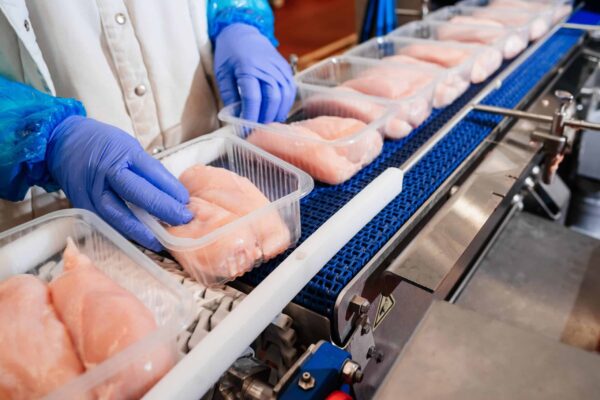
- Bakeries – for transporting dough, baked goods, and other bakery ingredients.
- Beverage Industry – for moving cans, bottles and soft drinks.
- Dairy Industry – for handling dairy products such as milk, cheese, and yoghurt.
- Meat and Poultry Plants – for transporting raw meat, poultry and processed meat products.
- Fruit and Vegetable Processing – for the movement of fruits and vegetables during washing, sorting, cutting, and packaging processes.
- Seafood Processing Plants – for handling fish, shellfish, and other seafood products.
- Snack Food Manufacturing – for handling snack foods such as crisps and nuts.
- Frozen Food Production – for handling a wide range of frozen food products.
- Confectionery Industry – for transporting chocolate, sweets and other confectionery items.
- Grain and Cereal Processing – for safely moving grains and cereals.
What Role Does Unitech Play?
So we now know what role conveyors play in the food industry, but how do we play our part? At Unitech, we are able to provide all the conveyor systems we mentioned above in order to help grow your business. Get in touch with us today for a quote on any of our conveyors or simply contact us on 01543 675800 for more information. We’ll be happy to help.
